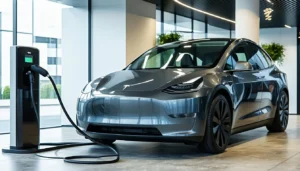Developments in vehicles, changes in emission regulations, shut-downs and record months; the automotive industry has seen an incredible amount of change over the past year and a half. What has been behind several of these changes? A fluctuating supply chain, that has affected all facets of the automotive industry.
In this blog, we take a look at the disrupted supply chain: what is it, what’s causing it and hear from brokers on its effect and future recovery.
What’s Going On?
Changes in legislation, Brexit and, of course, Covid-19 have impacted the automotive supply chain, creating significant delays in vehicle delivery times. Let’s look at three primary factors:
- Covid-19
Between April and June of 2020, automotive manufacturing virtually stopped due to the first lockdown. Originally coupled with a decline in customer demand due to economic uncertainty, the initial path for manufacturing was unclear. 2021 however, has seen the desire for vehicles only increasing, and now, it’s predicted that due to covid-related delays volumes are likely to take up to three years to recover.
- Semiconductors
Semiconductors are a vital component in building modern cars, as they’re used in driver assistance systems. As they’re required for other electronic devices too, covid related delays have increased demands for semiconductors, impacting their availability for vehicles. This subsequently caused the shut-down of factories across the UK, like Honda, further halting production.
- Brexit
Brexit imposed rule of origin requirements, whereby 40% of parts must be manufactured in the EU or UK, has also caused delays and halts in production, as manufacturers strive to onboard new legislation to meet changing requirements.
What’s the impact?
The BVRLA undertook a Business Impact Survey to determine opinions on automotive economic recovery, and the responses were largely geared towards the supply chain issue. The findings showed that ‘although the industry is optimistic about economic recovery, there is large concern about vehicle supplies. Over 90% of respondents suggest that the supply of ICE vans was a barrier to meeting the needs of customers, with 41% saying the barrier was extreme.’
What does the future hold?
In the same report, the BVRLA found that 90% of the respondents anticipated that the economy will improve over the next six months. In fact, in May 2021, car production rose dramatically with 53,962 cars produced, over 5,314 a year ago. Despite this, performance is still below pre-pandemic levels, down 52.6% from 2019.
What do automotive professionals think?
We asked brokers for their thoughts on the disrupted supply chain:
“The supply chain issues we are currently experiencing in the automotive market are causing a significant issue for our business. Limited stock (and surprisingly stable demand) is causing a feeding frenzy among brokers and batches of stock vehicles are disappearing much faster than usual. The improved operational speed we have from the QV Accelerate Platform is, however, allowing us to get quotes out faster and speed up credit applications. This greatly minimises the risk of our clients missing out on the stock vehicles they desire.
Due to a recent partnership with a large trade association, we are experiencing a huge increase in van enquiries. Often, van drivers like to wait until their vehicle is almost unroadworthy before enquiring about another. Exceedingly low levels of van stock are causing real problems for us, pushing many of our clients towards the used market to keep their businesses running. With much uncertainty still around the Covid-19 situation and the global semiconductor shortage, we believe there’s still a tough 6-12 months ahead of us”. Paul Thomas, Managing Director, Yorkshire Vehicle Finance
“Supply chain disruption is nothing new and we’ve experienced issues a number of times over the years but nothing on this level and nothing that has affected every manufacturer! The one saving grace is that everyone is in the same boat whether you are a broker or a dealer, so the answer to customers is just the same. What it has meant, is that we are having earlier conversations with our customers about renewals or additions with lead times being so long, which is improving our customer retention.
The general consensus from the manufacturers we deal with is, that we won’t see the supply chain improve until Q1 2022 so we are in for a challenging second half of the year but as van specialist we still know where to find them!” Dave Rainer, Managing Director, Crusader Vans


